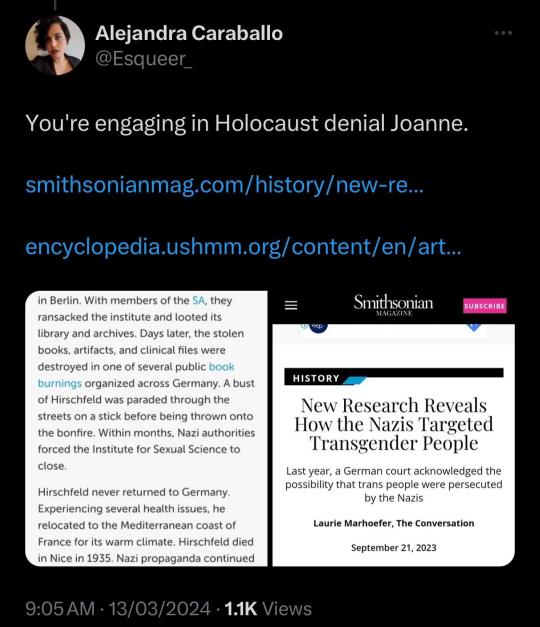#cw shoah denial
Text


Edit:holy fuck it gets worse

#anti jkr#anti J.K Rowling#Terfs dni#transphobia cw#cw jk rowling#anti terf#cw holocaust denial#cw shoah denial#twitter screenshot
14 notes
·
View notes
Text
Working through antisemitism in Holy Week, post 1
cw: violent antisemitism in history
I’m posting the majority of one of the articles I’ve read on antisemitism and Holy Week below. Questions I have after reading it include:
So, is it possible to read the Gospels’ Passion narratives in their original language without perpetuating anti-Jewish worldviews and violence?
While I think I agree that the tensions between Jesus and the other Jewish leaders of his day should be understood as intra-community conflict....how do we communicate that to our congregants when so much Gospel language does not assist that interpretation?
Does it help the antisemitism problem at allto point out that Jesus’ friends and supporters were Jewish too, not just his “enemies” -- especially when, as this article notes, even his friends “colluded by their silence” in his death?
And my biggest question of all of all -- does the last view included in this article, Ched Myers’ assertion that the Passion narrative shows a collusion of power with Pilate/Romans and the “Jewish elites,” actually help with the antisemitism problem? Especially when the Pharisees who number among those so-called “Jewish elites” are the predecessors of modern Judaism?
______
“That the story of Christ’s Passion has inspired passionate responses through the ages should surprise no one. ...The story begs us to ask who would treat a man who has given sight to the blind and hope to the poor in such a horrible fashion. Who, in short, is to blame?
For centuries the answer seemed simple: “the Jews.” They rejected Jesus’ claim to be the Messiah and duped the Romans into executing him. For Christians who revered Jesus as divine (and seemed to forget that Jesus was himself a Jew), the Jews were “God killers.” ...From the fourth century, when Emperor Constantine converted to Christianity, bringing the power of Rome with him, the very survival of the Jews came into question. The popularity of medieval Passion Plays often spurred violent pogroms in their wake. On their way to fight for Jerusalem, Crusaders slaughtered European Jews as a warm-up. In the twentieth century, the Holocaust (or Shoah) was not a direct expression of Christian anti-Judaism, but the structures of hate laid by the Church over the centuries created a platform for the Nazi perversion.
Today some ask whether the public reading of the Passion in the language of the four canonical Gospels perpetuates the anti-Jewish views that have given rise to such violence. Others point out the centrality of the Passion story to Christianity and argue that, while the texts have undeniably been used for anti-Jewish purposes, they are not inherently anti-Jewish.
The Second Vatican Council proclaimed that New Testament references to “the Jews,” once taken to mean all Jews at all times, were directed only at the Jewish authorities in first century Palestine. Roman Catholic scholar Raymond Brown demonstrated how the harsh rhetoric used against “the Jews” would have been understood by its first readers and hearers as part of an intra-family dispute. First century Jews would have recognized that Jesus used much of the same language with which the Hebrew Prophets, such as Jeremiah and Amos, criticized the rulers of Israel. Later, as Christianity spread widely among the Gentiles (non-Jews), the misunderstanding of “us and them” developed and metastasized.
Other scholars, using a historical-critical approach to scripture, traced what seemed to be a conscious effort in the texts to exonerate the Romans, within whose empire the budding Jesus movement had to survive, and to lay blame on the Jews, with whom it had to compete.
While it’s true that no one needed to dupe Pilate into executing troublemakers – Rome would ultimately recall him for being too bloody even by their imperial standards – others objected that such a move required a greater degree of skepticism about the accuracy of the scripture than many Christians would embrace.
Another brilliant New Testament scholar, Protestant Ched Myers, makes the case that we need neither demonize the Jews nor suspect the Gospel writers. Using a close reading of the earliest Gospel, Mark, he finds that what’s depicted is the collusion of all those in power – Pilate and the Jewish elites in particular. The crowd and even the disciples collude by their silence and, in Peter’s case, denial. In short, there is plenty of blame to go around. Like the prophets before him, Jesus opposed the systems of domination that oppressed the poor. His criticism of the Judean authorities was no more anti-Jewish than Martin Luther King’s condemnation of Jim Crow laws was anti-American. And as Jesus himself predicted, he received the prophet’s reward of death. ...”
- “A Note on ‘The Jews’ in the Palm Sunday Passion Reading”
#passion plays#passion week#holy week#issues in christianity#antisemitism#quote tag#readings#notes#spring 2020
12 notes
·
View notes